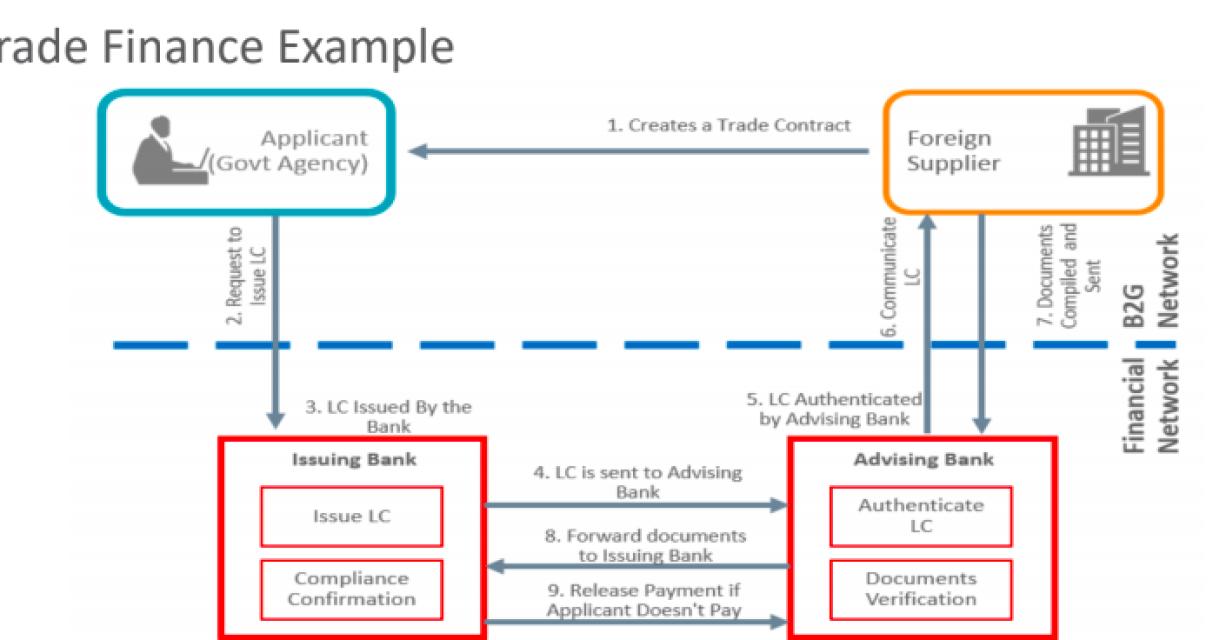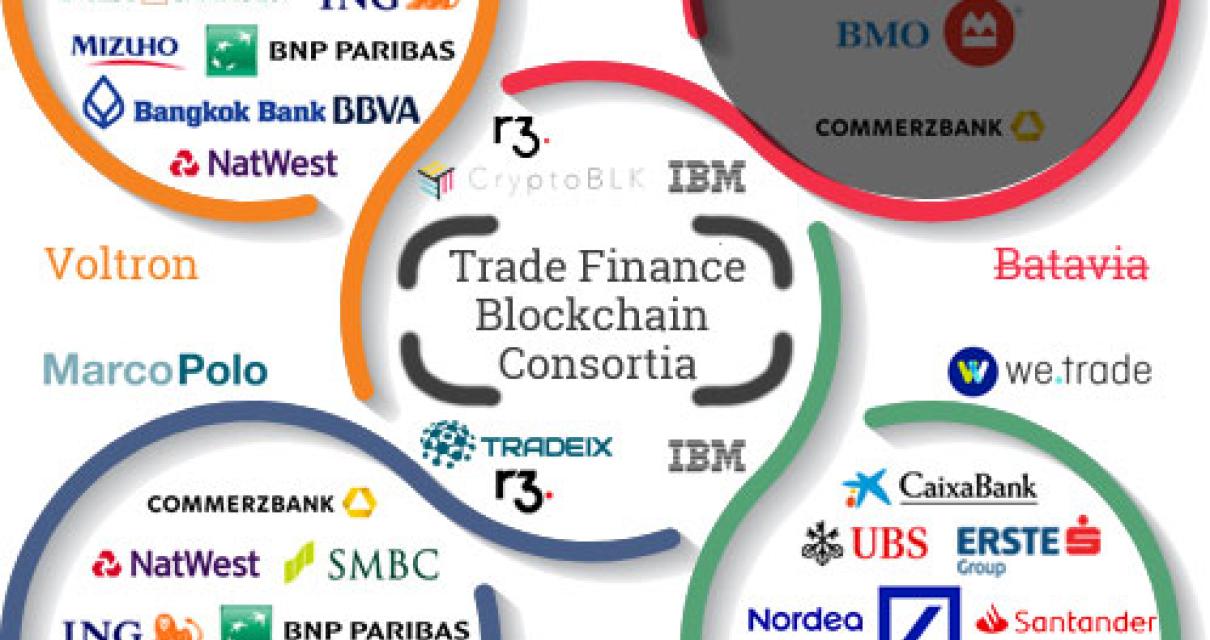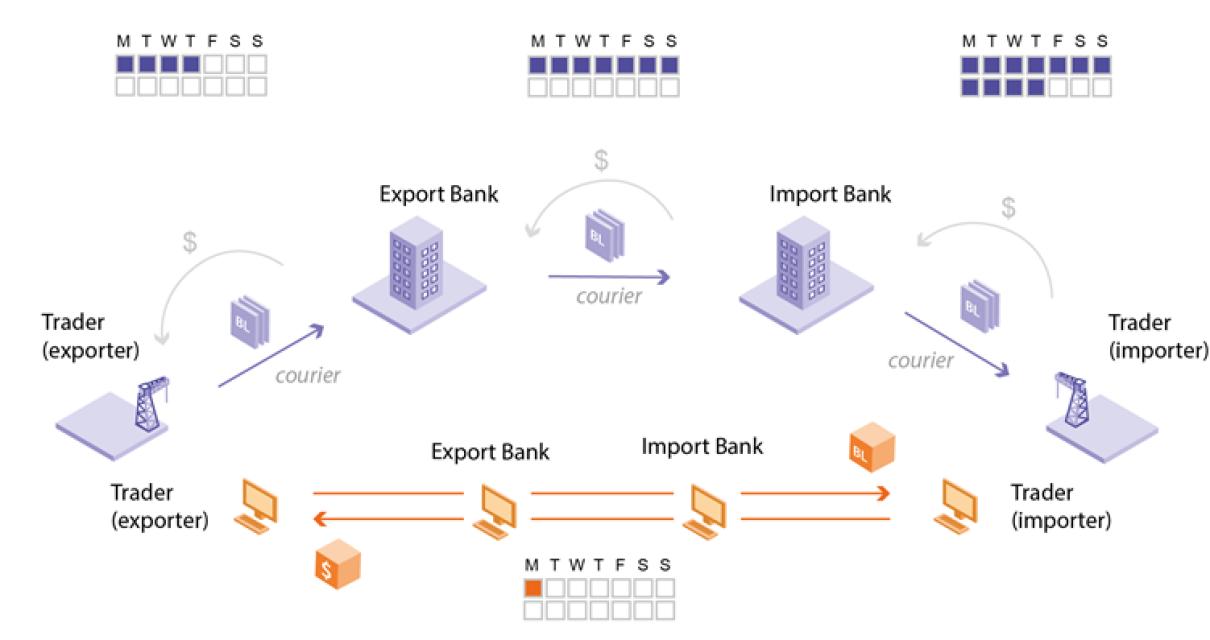How Blockchain is Transforming Trade Finance
In trade finance, blockchain technology is being used to create a transparent and secure system for exchanging goods and services.
The blockchain is a distributed ledger that allows for the recording of transactions between two parties without the need for a third party. Transactions are verified and confirmed by network nodes using cryptography.
The benefits of using blockchain in trade finance include:
Reduced Risk: Transactions are verified and confirmed by network nodes, eliminating the risk of fraud and other malicious activities.
Transactions are verified and confirmed by network nodes, eliminating the risk of fraud and other malicious activities. Improved Security: The decentralized nature of the blockchain makes it difficult for anyone to tamper with the data.
The decentralized nature of the blockchain makes it difficult for anyone to tamper with the data. Reduced Costs: The elimination of the need for third-party verification and confirmation reduces the costs associated with trade finance transactions.
The elimination of the need for third-party verification and confirmation reduces the costs associated with trade finance transactions. Increased Transparency: The transparency of the blockchain allows users to track the status of transactions and understand their overall financial situation.
The transparency of the blockchain allows users to track the status of transactions and understand their overall financial situation. Enhanced Speed: The blockchain can process transactions quickly and with minimal overhead, compared to traditional trade finance systems.
The blockchain can process transactions quickly and with minimal overhead, compared to traditional trade finance systems. Increased Efficiency: The use of smart contracts allows for automated and streamlined transactions between parties.
The use of smart contracts allows for automated and streamlined transactions between parties. Reduced Costs: By eliminating the need for third-party involvement, blockchain technology can reduce the costs associated with trade finance transactions.
The Benefits of Blockchain in Trade Finance
There are many benefits of blockchain in trade finance. Some of the benefits include:
1. Improved transparency and traceability.
2. Reduced time and cost associated with transactions.
3. Increased security and accuracy of records.
4. Enhanced trust and confidence between parties involved in a trade.
5. Increased efficiency and reduced costs associated with trade transactions.
How Blockchain Helps Streamline Trade Finance
Blockchain technology has the potential to streamline trade finance. The technology allows for secure, transparent and tamper-proof tracking of goods throughout the supply chain. It can also help reduce costs and time delays associated with trade transactions.
The Use of Blockchain in International Trade Finance
Blockchain technology has the potential to revolutionize the way international trade is conducted. The technology is decentralized, meaning it is not subject to the control of any one institution or individual. This makes it an ideal platform for conducting transactions that are secure and transparent.
There are a number of potential benefits that could be associated with the use of blockchain in international trade. These include:
1. Improved Transparency and Security: Blockchain is a transparent and secure platform that can help to ensure that all transactions are recorded and verified. This ensures that both parties involved in a trade transaction are aware of what has taken place and that the security of the transaction is protected.
2. Reduced Costs and Timeframes: Blockchain technology can help to reduce the time and costs involved in international trade transactions. This is because it can help to streamline the process by removing the need for third-party verification and authentication.
3. Increased Efficiency: The use of blockchain technology can also help to increase the efficiency of international trade transactions. This is because it can help to reduce the amount of information that needs to be processed and crosschecked.
4. Reduction in Counterfeiting and Fraud: The use of blockchain technology can help to reduce the incidence of counterfeiting and fraud in international trade. This is because it can help to ensure that all transactions are recorded and verified in a transparent manner.
There are a number of potential challenges that could be associated with the use of blockchain in international trade. These include:
1. Lack of Scalability: Blockchain technology is currently not scalable enough to support the large number of transactions that are currently taking place in the global trade market. This is likely to be a significant barrier to its wider adoption in this area.
2. Limited Use Cases: Currently, there are limited use cases for blockchain technology in international trade. This means that it is not currently being used to its full potential in this area. This could be due to the lack of suitable applications or due to the complexity of implementing the technology in this context.
3. Initial Costs: The initial costs associated with implementing blockchain technology in international trade may be high. This is because it requires a significant investment in terms of time and resources.

Why Blockchain is the Future of Trade Finance
Blockchain technology has the potential to revolutionize the trade finance industry. Here are four reasons why:
1. Transparency: Blockchain is an open and transparent platform that allows for easy tracking of transactions. This makes it easier for businesses to verify and track the status of their transactions.
2. Security: Blockchain is a secure platform that allows for tamper-proof transactions. This makes it difficult for hackers to steal sensitive information or make fraudulent transactions.
3. Efficiency: Blockchain technology is highly efficient, which means it can quickly process large amounts of data. This makes it a valuable tool for trade finance transactions.
4. Cost Savings: Because blockchain technology is more efficient than traditional trade finance platforms, it can save businesses money on their trade finance fees.
How Blockchain Can Enhance Trade Finance
Blockchain technology can help improve trade finance by providing a secure, tamper-proof and transparent platform for managing transactions. The technology can also help reduce the time it takes to process transactions, which can help improve business efficiency. Additionally, blockchain can help reduce the amount of paperwork needed for trade transactions, which can help streamline the process.

The Importance of Blockchain in Trade Finance
Blockchain technology is a distributed database that allows for secure and transparent transactions between two parties. It is currently being used in a number of different industries, including trade finance.
One of the key advantages of using blockchain technology in trade finance is that it eliminates the need for third-party verification. This makes transactions more secure and reduces the chances of fraud and other errors.
Additionally, blockchain technology allows for tracking and tracing of goods throughout the supply chain. This can help to ensure that products are delivered on time and in accordance with specification.
Overall, blockchain technology is becoming increasingly important in trade finance due to its various advantages over traditional methods. By using it in conjunction with other technologies, businesses can ensure that their transactions are as secure and efficient as possible.
What Blockchain Can Do for Trade Finance
Blockchain technology can revolutionize trade finance. It can help reduce the time it takes to process and execute a trade, as well as reduce the cost of doing business.
One of the most popular applications of blockchain technology is in the cryptocurrency world. However, there are other potential applications, such as trade finance.
Traditional trade finance involves a number of parties, including banks, brokers, and cargo companies. Each party has its own system and processes, which can make it difficult to track the status of a shipment.
Blockchain technology can help reduce the time it takes to process and execute a trade. It can also help reduce the cost of doing business.
For example, blockchain can be used to create a tamper-proof record of a shipment’s progress. This would allow both the shipping company and the bank to track the delivery of the goods.
Another example of how blockchain can help reduce the cost of trade is by creating a system for settling transactions. This would allow trade partners to avoid the expensive fees that are often associated with traditional trade finance systems.
Overall, blockchain technology has the potential to revolutionize trade finance. By automating and reducing the time it takes to process and execute a trade, blockchain could make trade more efficient and cost-effective.

The Power of Blockchain in Trade Finance
The blockchain technology is a distributed database that allows for secure, transparent and tamper-proof transactions. The technology was created as a way to secure and track the ownership of digital assets. Blockchain has the potential to revolutionize the trade finance sector by allowing for faster and more secure transactions.
Blockchain has the ability to reduce the time it takes to complete a trade transaction from days to minutes. This is due to the fact that blockchain is a transparent platform that allows for all parties involved in a trade to view the details of the transaction. Additionally, blockchain is immune to fraud and tampering, which means that transactions are more secure and accurate.
In addition to reducing the time it takes to complete a trade, blockchain also has the potential to reduce the cost of trade transactions. The technology is already being used to create decentralized trade platforms, which eliminates the need for third-party intermediaries. This has the potential to reduce the costs associated with trade transactions, such as commissions and fees.
Overall, blockchain has the potential to revolutionize the trade finance sector by allowing for faster, more secure and tamper-proof transactions.
How Blockchain is Revolutionizing Trade Finance
Blockchain is revolutionizing trade finance in a big way. It is a distributed database that allows for secure, transparent and tamper-proof transactions. This technology has the potential to streamline the process of trade finance by eliminating the need for multiple parties to collaborate. Additionally, it can help to reduce the risk of fraud and ensure the accuracy of information.